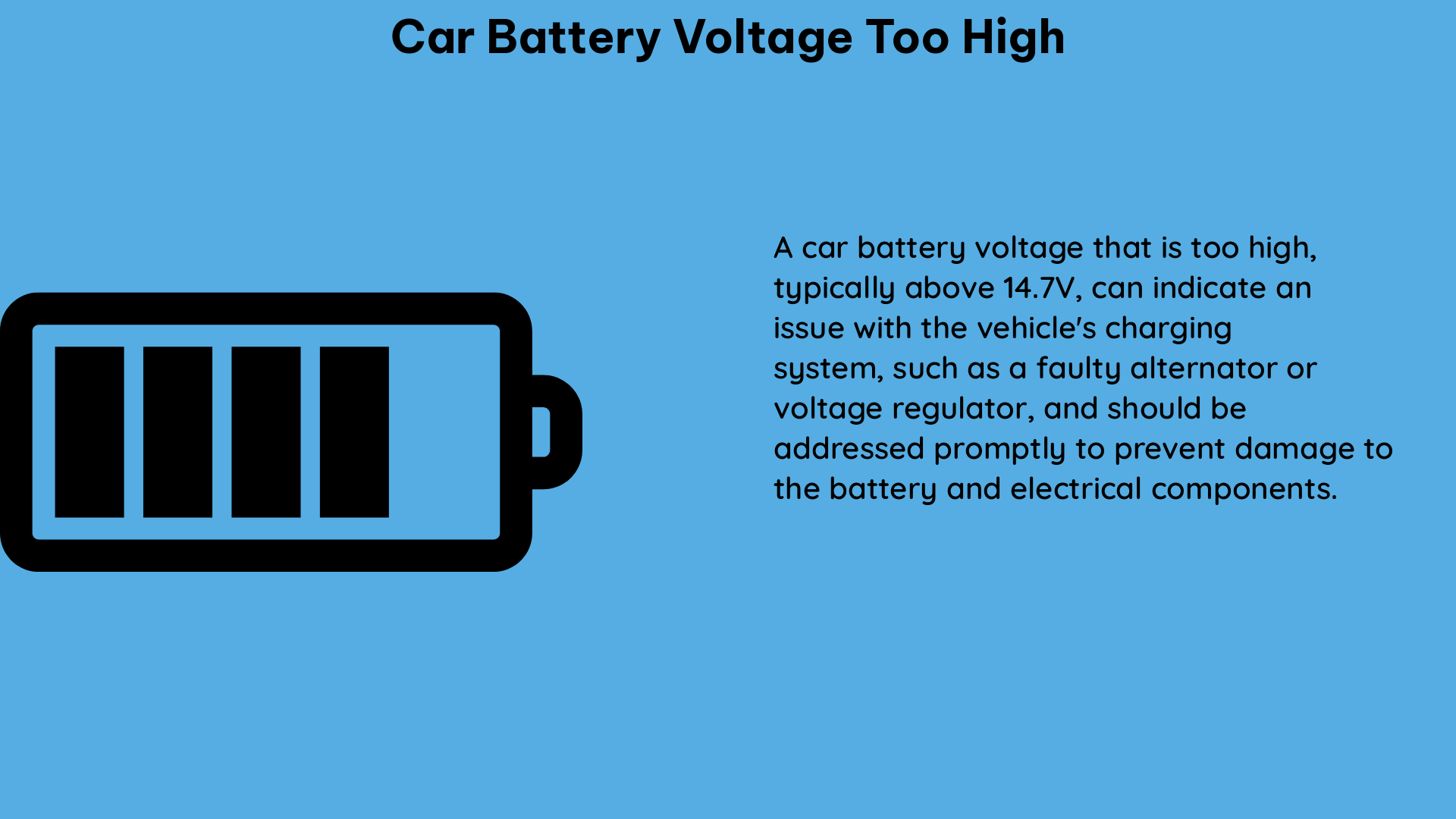When it comes to the health and performance of your vehicle, the car battery voltage is a crucial factor to monitor. A car battery voltage that is too high can indicate a serious issue that requires immediate attention. This comprehensive guide will delve into the technical details, potential causes, and effective solutions for addressing a car battery voltage that is too high.
Understanding Ideal Car Battery Voltage
The ideal voltage range for a car battery at idle is between 13.8 to 14.3 volts. This range ensures that the battery is properly charged and the electrical system is functioning as intended. Anything above 14.8 volts is considered overcharging, which can lead to various problems.
Excessive Car Battery Voltage: Causes and Consequences

A car battery voltage above 15 volts is considered excessive and can be potentially damaging to the battery and electrical components of the vehicle. There are several factors that can contribute to a high battery voltage:
Acid Stratification
Acid stratification is a common cause of high battery voltage. This occurs when the electrolyte of the battery concentrates at the bottom, starving the upper half of the cell. This can happen if the battery is left at a low charge, never receives a full charge, and experiences shallow discharges. Driving a car for short distances with power-robbing accessories engaged can also contribute to acid stratification, as the alternator may not be able to apply a saturated charge.
When a battery is stratified, the acid concentration is heavier at the bottom and lighter at the top. This unequal charge across the plates raises the open circuit voltage, making the battery appear more charged than it actually is. This artificial increase in voltage can also reduce the battery’s cold cranking amps (CCA), making it harder to start the engine.
Voltage Regulator or Alternator Issues
Another potential cause of a car battery voltage that is too high is a problem with the voltage regulator or alternator. If these components are not functioning correctly, they can cause the battery to be overcharged, leading to an excessive voltage reading.
Old or Faulty Battery
An old or faulty battery can also contribute to a high voltage reading. As batteries age, their internal resistance can increase, leading to an imbalance in the charge distribution and a higher voltage output.
Addressing a Car Battery Voltage That Is Too High
If you have determined that your car battery voltage is too high, there are several steps you can take to address the issue:
-
Measure the Battery Voltage: Use a multimeter to measure the battery voltage at idle. This will help you determine the exact voltage level and identify the severity of the problem.
-
Check for Signs of Overcharging: If the voltage is above 15 volts, inspect the battery for signs of overcharging, such as boil over or warped plates.
-
Inspect the Voltage Regulator and Alternator: If the voltage is between 14.8 and 15 volts, consider checking the voltage regulator and alternator for any issues.
-
Replace the Battery: If the battery is old (more than 5 years) or has a low capacity, consider replacing it to address the high voltage problem.
-
Check Battery Acceptance: If the battery is new, ensure that it is properly accepted as part of the acceptance process.
-
Charge the Battery Externally: If the car is driven for short distances with power-robbing accessories engaged, consider charging the battery occasionally with an external charger or switching to an AGM battery, which is less susceptible to acid stratification.
-
Correct Acid Stratification: If the battery is stratified, you can try allowing it to rest for a few days, shaking or tipping it, or applying an equalizing charge. Raising the voltage of a 12-volt battery to 16 volts for 1-2 hours can help mix the electrolyte through electrolysis, but avoid extending the topping charge beyond the recommended time.
Technical Specifications
| Specification | Value |
|---|---|
| Ideal car battery voltage at idle | 13.8 to 14.3 volts |
| Overcharging voltage | Above 14.8 volts |
| Excessive voltage | Above 15 volts |
| Acid stratification | Unequal charge across the plates, reducing CCA |
| Equalizing charge | Raising the voltage of a 12-volt battery to 16 volts for 1-2 hours to mix the electrolyte through electrolysis |
Conclusion
Maintaining the proper car battery voltage is crucial for the health and performance of your vehicle. If you encounter a car battery voltage that is too high, it is essential to address the issue promptly to prevent potential damage to the battery and electrical components. By understanding the causes, consequences, and effective solutions, you can ensure your car’s electrical system is functioning at its best.
References
- Is this a normal battery voltage or is it too high?
- Acid Stratification and Surface Charge
- Is 15V too high for a standard car battery?

The lambdageeks.com Core SME Team is a group of experienced subject matter experts from diverse scientific and technical fields including Physics, Chemistry, Technology,Electronics & Electrical Engineering, Automotive, Mechanical Engineering. Our team collaborates to create high-quality, well-researched articles on a wide range of science and technology topics for the lambdageeks.com website.
All Our Senior SME are having more than 7 Years of experience in the respective fields . They are either Working Industry Professionals or assocaited With different Universities. Refer Our Authors Page to get to know About our Core SMEs.